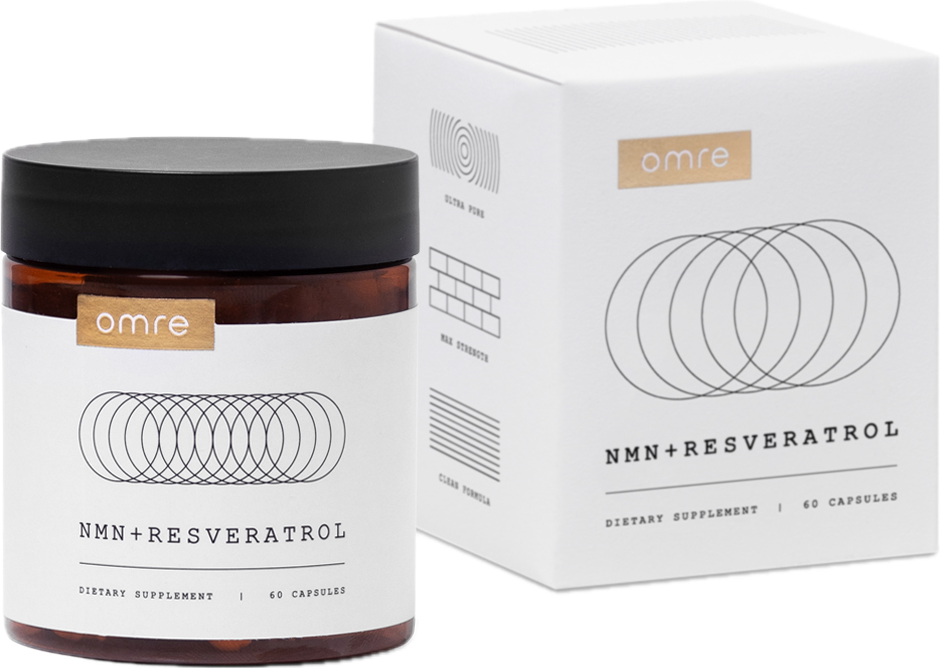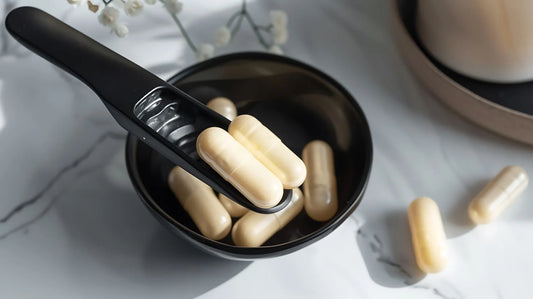Table of Contents
- What Is the Optimal TMG Dosage with NMN for Best Results?
- What is NMN?
- What Are the Potential Benefits of NMN Supplements?
- What is TMG?
- What Are the Potential Benefits of TMG Supplements?
- How TMG and NMN Work Together
- Why Should You Take NMN and TMG Together?
- Is It Okay to Take NMN and TMG Together?
- Is It Safe to Take TMG with NMN?
- How to Choose the Best TMG and NMN Supplements
- Conclusion
When it comes to boosting energy, supporting cellular health, and promoting longevity, NMN has taken center stage in recent years.
But did you know the effectiveness of NMN could be significantly enhanced when paired with TMG (Trimethylglycine)?
Finding the right TMG dosage with NMN isn’t just about taking supplements—it’s about achieving the perfect balance to support your body’s natural processes.
In this article, we’ll dive into the science behind this powerhouse combination, uncover how TMG complements NMN, and explore what research says about the ideal dosages to maximize their benefits.
NMN + RESVERATROL
Cellular NAD+ booster with ultra‑pure NMN and Resveratrol, at research‑backed doses.*
What Is the Optimal TMG Dosage with NMN for Best Results?
A common recommendation for TMG dosage with NMN is a 1:1 ratio. For example, if you’re taking 500 mg of NMN, pairing it with 500 mg of TMG is a good starting point to support healthy methylation.
Dr. David Sinclair, a well-known longevity researcher, suggests taking 500–1,000 mg of TMG daily to supplement NMN. This balance ensures NMN enhances NAD+ levels without compromising your body’s methylation processes. Whether you’re starting small or using higher doses of NMN, adjusting TMG accordingly can make a difference.
What is NMN?
NMN, short for nicotinamide mononucleotide, is a naturally occurring compound found in the body that plays a critical role in energy metabolism and cellular health. As a precursor to NAD+ (nicotinamide adenine dinucleotide), NMN helps maintain proper cellular functions, including DNA repair and energy production, which are essential for overall well-being.
Research suggests that as we age, NAD+ levels decline, potentially impacting energy levels and the body’s ability to repair itself.
Supplementing with NMN may support the body’s ability to produce NAD+ and promote better health and longevity. While NMN is still under study, its potential benefits have gained significant attention in the health community.
What Are the Potential Benefits of NMN Supplements?
NMN has been the focus of several studies, particularly for its role in supporting cellular health and aging. Below are some of the most discussed potential benefits:
Supports Cellular Energy Production
NMN serves as a precursor to NAD+, which fuels essential cellular processes. Higher NAD+ levels have been linked to improved energy metabolism and better overall cell function.
For example, Studies in older mice found that NMN supplementation restored cellular energy production, contributing to better health outcomes (1).
Promotes DNA Repair
Cells use NAD+ to activate enzymes called sirtuins, which play a role in repairing damaged DNA. Damage to DNA accumulates with age, and NMN may help the body maintain its natural repair mechanisms (2).
While human studies are limited, early research in mice has shown encouraging results.
May Improve Insulin Sensitivity
A study on postmenopausal women with prediabetes found that 250 mg of NMN daily over ten weeks increased insulin sensitivity and signaling (3). Although more research is needed, this finding suggests NMN might support healthy blood sugar levels.
Could Enhance Muscle Function
In studies with older mice, NMN supplementation was associated with improved muscle strength and endurance (4). While human studies are still catching up, these results hint at NMN’s potential to support physical performance, particularly in aging populations.
May Support Brain Health
NAD+, which NMN helps produce, has been linked to protecting brain cells from oxidative stress and mitochondrial dysfunction. Animal studies suggest that NMN supplementation could support cognitive health, although human-specific research is still in progress (5).
What is TMG?
TMG, or trimethylglycine, is a compound derived from glycine and naturally found in foods like beets, spinach, and quinoa. It plays a key role in methylation, a biochemical process that supports DNA repair, detoxification, and overall cellular health.
TMG acts as a methyl donor, helping the body regulate homocysteine levels and produce important compounds like methionine. This makes it a valuable addition to NMN supplementation, as NMN can deplete methyl groups during NAD+ production.
What Are the Potential Benefits of TMG Supplements?
TMG is often used for its ability to support methylation and homocysteine regulation. Below are some of its key potential benefits, supported by research and studies:
Regulates Homocysteine Levels
High levels of homocysteine in the blood are associated with an increased risk of heart disease. TMG helps convert homocysteine into methionine, a process that supports cardiovascular health. Studies suggest that supplementing with TMG can effectively lower homocysteine levels (6).
Supports Liver Function
TMG plays a role in fat metabolism and may help reduce liver fat accumulation. Studies in animals have shown that TMG supplementation improved liver function and reduced the risk of fatty liver disease, making it a potential option for liver support (7).
Enhances Methylation Processes
Methylation is critical for DNA repair, detoxification, and neurotransmitter production. By providing methyl groups, TMG supports these processes, contributing to overall cellular health and improved metabolic balance (8).
May Improve Exercise Performance
Some athletes use TMG to enhance endurance and strength. While the research is mixed, certain studies have shown that TMG supplementation might reduce fatigue and support creatine production, which helps muscle cells generate energy (9).
Supports Mental Well-being
TMG’s role in methylation may also influence neurotransmitter production, potentially supporting mood regulation and mental clarity (10). While this benefit needs further research, anecdotal reports suggest positive effects on mental well-being.
How TMG and NMN Work Together
 TMG and NMN are a powerful pair for supporting health and longevity. NMN enhances NAD+ production, which fuels essential cellular processes, while TMG helps maintain healthy methylation, a process crucial for DNA repair and energy production. Together, they work to optimize your body’s functions.
TMG and NMN are a powerful pair for supporting health and longevity. NMN enhances NAD+ production, which fuels essential cellular processes, while TMG helps maintain healthy methylation, a process crucial for DNA repair and energy production. Together, they work to optimize your body’s functions.
The Role of TMG in Methylation
Methylation is the process of transferring methyl groups (CH3) within the body. It’s critical for tasks like DNA repair, energy metabolism, and neurotransmitter production. Unfortunately, methylation efficiency often declines with age, which can lead to imbalances.
Why TMG Matters:
TMG serves as a methyl donor, keeping methylation smooth and functional.
It may help reduce risks associated with poor methylation, such as heart disease and neurodegenerative conditions, but more research is needed.
In populations with genetic issues affecting methylation, TMG supplementation can be especially beneficial.
The Role of NMN in NAD+ Production
NMN helps increase NAD+ levels, a molecule essential for energy production and activating sirtuins, which are linked to longevity. Studies suggest NMN supplementation can nearly triple NAD+ levels in the body, potentially rejuvenating cellular function.
What NMN Does:
Supports physical performance, including better endurance and strength.
It may improve insulin sensitivity and heart health.
Plays a key role in cellular repair, particularly as we age.
Synergistic Effects of TMG and NMN
TMG and NMN complement each other by addressing different needs:
NMN depletes methyl groups during its conversion to NAD+, and TMG replenishes these groups, ensuring methylation processes stay intact.
This combination helps sustain energy, supports muscle function, and promotes long-term cellular health.
NMN + RESVERATROL
Cellular NAD+ booster with ultra‑pure NMN and Resveratrol, at research‑backed doses.*
Why Should You Take NMN and TMG Together?
Taking NMN and TMG together supports both NAD+ production and methylation. While NMN enhances cellular energy and longevity, it also consumes methyl groups, which can lead to imbalances if not replenished. TMG provides a source of methyl groups, making the combination more effective.
Methylation involves adding methyl groups to molecules like DNA, proteins, and lipids. This process is critical for gene expression, detoxification, and maintaining cellular function.
Since NMN depletes methyl groups to produce NAD+, adding TMG ensures your body has the resources it needs to keep functioning optimally.
Why experts recommend this pairing:
NMN increases NAD+ levels but depletes methyl groups.
TMG replenishes these groups, supporting overall balance.
Combining these supplements may enhance benefits for cellular health and longevity.
Is It Okay to Take NMN and TMG Together?
 Yes, it’s generally okay to take NMN and TMG together, and they may work better as a pair. While NMN supports NAD+ production, TMG maintains the methylation balance required for optimal cellular health.
Yes, it’s generally okay to take NMN and TMG together, and they may work better as a pair. While NMN supports NAD+ production, TMG maintains the methylation balance required for optimal cellular health.
Adding TMG can help offset the depletion of methyl groups caused by NMN supplementation, especially at higher doses.
When taking both, it’s important to use the right ratios to maximize their benefits without causing imbalances. For most people, starting with equal doses of NMN and TMG is a practical approach.
Is It Safe to Take TMG with NMN?
Yes, it is generally safe for most people to take TMG and NMN together, especially when staying within the recommended dosages. These two supplements complement each other, with TMG supporting methylation and NMN enhancing NAD+ production. Together, they provide balanced support for cellular health.
That said, individual responses can vary. It’s wise to start with lower doses and observe how your body reacts before increasing.
Exceeding the suggested dosage on the supplement label doesn’t necessarily lead to better results and might increase the likelihood of minor side effects like digestive discomfort.
If you’re currently taking other medications or have any underlying health conditions, it’s best to consult a healthcare professional before introducing TMG and NMN into your routine. Personalized advice ensures these supplements fit well with your specific health needs.
How to Choose the Best TMG and NMN Supplements
Quality and transparency matter most when selecting TMG and NMN supplements. Here are some tips to guide your choice:
Purity: Look for supplements with a high level of purity (98% or more) to avoid fillers and contaminants.
Research-Backed Doses: Choose products with clearly labeled, research-supported dosages of TMG and NMN.
Third-Party Testing: Verify that the product has been independently tested for potency, purity, and safety.
Complementary Ingredients: Consider supplements that include additional beneficial components like Resveratrol or Bioperine® for enhanced absorption.
Customer Reviews: Read reviews to gauge real-world experiences with the product.
For example, Omre NMN + Resveratrol is a trusted option that combines 500 mg of NMN and 500 mg of Resveratrol per serving. Its ultra-pure formulation stands out for its quality and effectiveness.
The inclusion of Bioperine® further enhances absorption, making it a reliable choice for those looking to support NAD+ production and cellular energy.
Omre offers a 30-day money-back guarantee, giving you peace of mind to try the product risk-free. For the best results, readers can pair this with a high-quality TMG supplement to support healthy methylation alongside NAD+ production.
Conclusion
TMG and NMN are a synergistic duo that can help enhance cellular health, energy production, and overall vitality. When used together, TMG supports methylation, while NMN boosts NAD+ levels, creating a balanced approach to longevity and wellness.
Always stick to recommended dosages and consult a healthcare professional if you have specific health concerns. If you're ready to try a trusted supplement, Omre NMN + Resveratrol offers premium quality and effective dosages. Be sure to check availability to start your journey toward better cellular health.
If you're ready to try a trusted supplement, Omre NMN + Resveratrol offers premium quality and effective dosages. Be sure to check availability to start your journey toward better cellular health.





